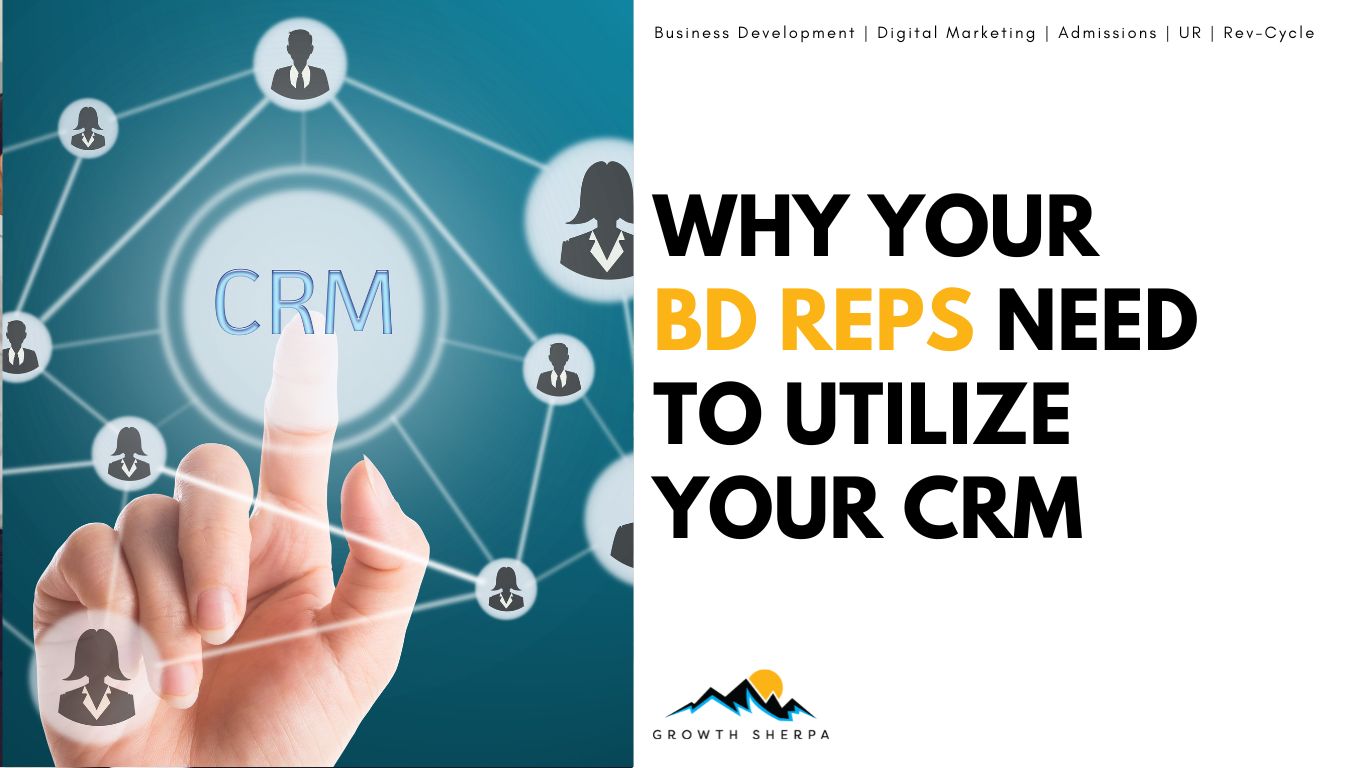A well-implemented Customer Relationship Management (CRM) system is the backbone of any high-performing business development (BD) team. Yet, many addiction treatment providers struggle with BD reps not fully utilizing their CRM, leading to missed opportunities, poor data tracking, and lost revenue. This article explores why CRM usage is crucial for BD reps and how it improves efficiency, strengthens relationships, and drives admissions.
The Role of CRM in Business Development
At its core, a CRM is designed to centralize all interactions with potential referral sources, track engagement, and provide data-driven insights to enhance BD strategies. Without a CRM, BD reps rely on spreadsheets, emails, or memory, which often leads to disorganized workflows, forgotten follow-ups, and an overall inefficient process. A CRM ensures that every referral partner interaction is documented, tracked, and strategically optimized.
Enhancing Relationship Management
Effective BD relies on nurturing long-term relationships with referral partners. A CRM allows reps to log conversations, track meeting notes, and set reminders for follow-ups. This ensures that no referral partner is neglected and that all interactions are meaningful and timely. When reps use the CRM properly, they can personalize their outreach efforts, recall past conversations, and demonstrate consistency—critical factors in building trust with partners.
Improving Follow-Up Efficiency
One of the biggest pitfalls in business development is failing to follow up on leads. A CRM helps BD reps stay on top of their pipeline by setting automated follow-up reminders, prioritizing high-value referral sources, and ensuring no opportunity slips through the cracks. By tracking each interaction, reps can also tailor their follow-ups based on previous discussions, making their outreach more impactful.
Measuring Performance and Accountability
For leadership, a CRM provides transparency into BD efforts. Managers can monitor outreach activity, track engagement levels, and measure conversion rates to assess individual and team performance. Without CRM data, it’s challenging to determine whether BD efforts are translating into actual admissions. With proper CRM usage, organizations can identify which strategies work best and adjust their approach accordingly.
Data-Driven Decision Making
A CRM isn’t just a tool for logging activity—it’s a powerful analytics platform. By analyzing CRM data, BD teams can determine which referral sources generate the most admissions, identify trends in referral behavior, and uncover opportunities for expansion. This data-driven approach enables addiction treatment providers to allocate resources effectively and refine their BD strategies for maximum impact.
Streamlining Communication Between Departments
Admissions and BD teams must work in sync to maximize patient intake. When BD reps log their interactions in the CRM, admissions teams have a clear view of referral source activity, allowing for better coordination and a smoother patient journey. This seamless communication ensures that referrals are handled promptly and professionally, improving the overall experience for both partners and clients.
Automating Routine Tasks
Manual data entry, email follow-ups, and appointment scheduling can consume valuable time that BD reps could spend building relationships. Many modern CRMs offer automation features that handle these repetitive tasks, freeing up reps to focus on high-value activities. Automation ensures that communication remains consistent and timely without requiring additional effort from the BD team.
Increasing Referral Conversion Rates
A well-utilized CRM helps identify referral partners who are actively engaged versus those who need more nurturing. By analyzing CRM data, BD reps can prioritize partners who have the highest potential for sending clients and develop targeted engagement strategies. This leads to higher referral conversion rates and increased admissions.
Ensuring Compliance and Documentation
In the addiction treatment industry, compliance is critical. A CRM provides a secure and structured way to document referral interactions, ensuring that all activities adhere to industry regulations. In the event of an audit, having a detailed record of communications and referral sources can help demonstrate ethical practices and compliance with legal requirements.
Overcoming Resistance to CRM Adoption
Despite the clear benefits, some BD reps resist using the CRM due to perceived complexity or added workload. Organizations must address these concerns through proper training, demonstrating the CRM’s value, and integrating it into daily workflows. Leadership should reinforce that CRM usage is not just an administrative task but a critical component of a successful BD strategy.
BD & CRMs
For addiction treatment providers, an effective BD strategy hinges on CRM utilization. From improving relationship management and follow-ups to providing data-driven insights and streamlining communication, a CRM is an indispensable tool for BD reps. Organizations that enforce CRM adoption will see stronger referral networks, higher admissions, and a more efficient business development process. Investing in training, automation, and accountability measures will ensure that BD reps fully leverage the power of the CRM to drive long-term success.




